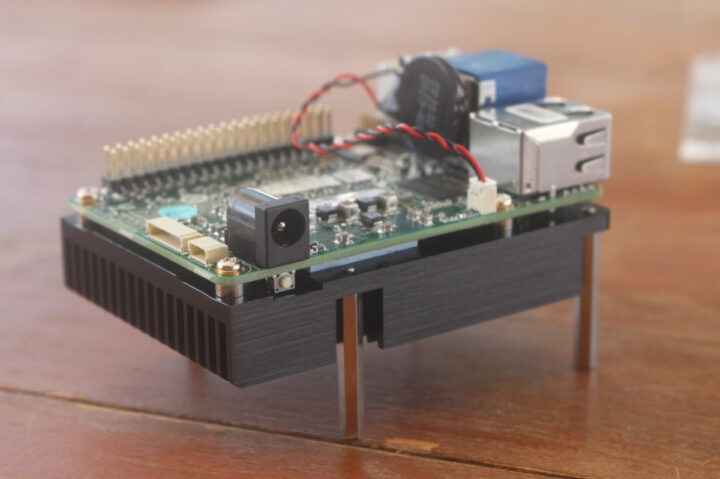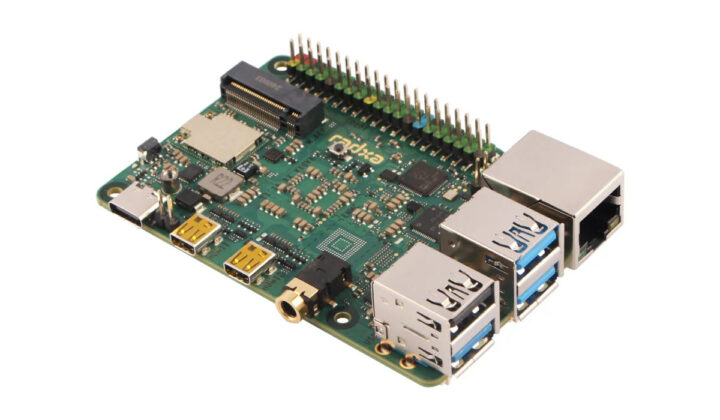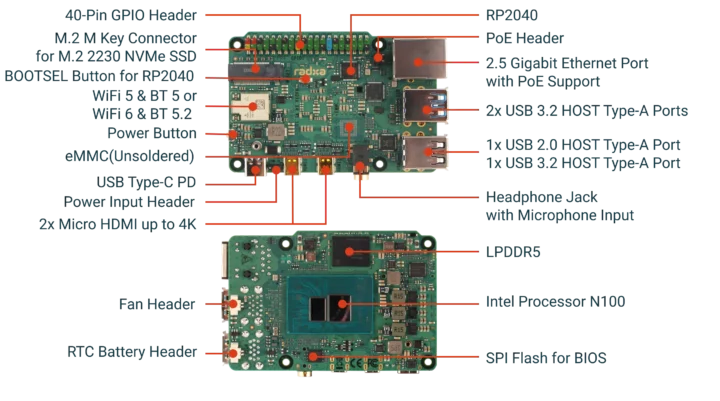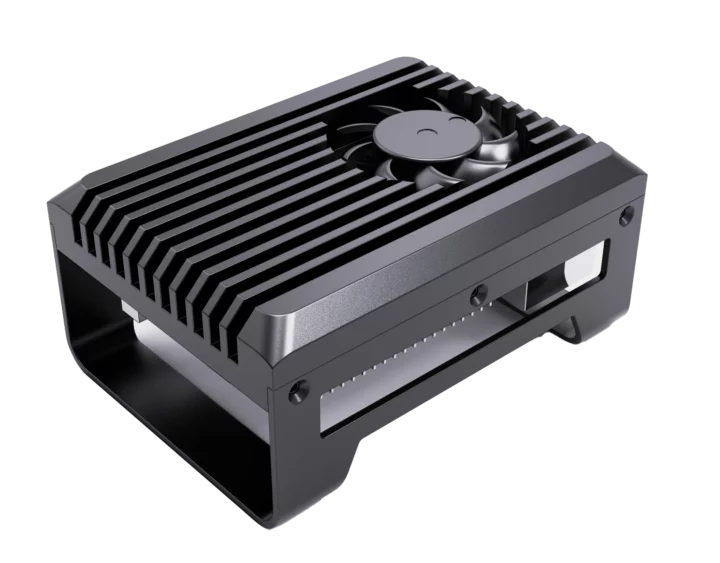Radxa X4 is a credit card-sized Intel Processor N100 single board computer (SBC) that costs almost the same as a Raspberry Pi 5 with the 4GB RAM model going for about $60 and the 8GB RAM variant around $80.
The x86 SBC offers many of the same features as the Raspberry Pi 5 including dual micro HDMI output, four USB 3.2/2.0 ports, Ethernet and WiFi networking, and the 40-pin GPIO header handled through a Raspberry Pi RP2040 microcontroller. Networking is better with 2.5GbE and WiFi 6, M.2 SSD support is built-in and four to eight times faster compared to PCIe HAT for the Pi 5, and the USB 3.2 ports are capable of 10 Gbps speed. So let’s little not too like, and the main downside is the lack of MIPI CSI and DSI connectors for projects requiring those camera and display interfaces.
Radxa X4 specifications:
- SoC – Intel Processor N100 quad-core processor up to 3.4 GHz (Turbo) with 6MB cache, 24EU Intel HD graphics @ 750 MHz; TDP: 6W
- MCU – Raspberry Pi RP2040 dual-core Cortex-M0+ microcontroller with 264KB SRAM for I/O control
- System Memory – 4GB or 8GB LPDDR5 (16GB optional, but not offered for sale yet)
- Storage
- M.2 M-Key socket for M.2 2230 NVMe (PCIe Gen 3.0 x4) SSD tested up to 3,400 MB/s (Read) and 3,100 MB/s (Write).
- SPI flash for the BIOS/UEFI
- eMMC flash footprint
- Video Output – 2x micro HDMI 2.0 ports up to 4Kp60
- Audio – 3.5mm headphone jack with microphone input
- Networking
- 2.5GbE RJ45 port with PoE support through optional PoE HAT
- Wireless
- WiFi 5 & BT 5 for 4GB RAM model
- WiFi 6 & BT 5.2 for 8GB RAM or more models
- USB
- 3x USB 3.2 host ports (10 Gbps)
- 1x USB 2.0 host port (480 Mbps)
- Expansion – 40-pin GPIO header with
- Up to 2x SPI
- Up to 2x UART
- Up to 2x I2C
- Up to 16x PWM
- Up to 8x PIO(Programmable IO)
- 1 x 5V DC power in
- 2 x 3.3V power pin
- Mostly compatible with the 40-pin Raspberry Pi GPIO header
- Misc
- Power Button
- BOOTSEL Button for RP2040
- Fan Header
- RTC Header
- BIOS features – Auto power on, Wake-on-LAN, RTC-timed wakeup, PXE boot
- Power Supply
- 12V/2A (min) via USB Type-C port with PD support. 25W+ recommended when all USB 3.0 are used
- 12V via power input header
- Dimensions – 85 x 56x 20mm
- Temperature Range – 0°C to 60°C
Radxa says Windows 10/11 and Debian/Ubuntu Linux distributions are supported on the board, but I’d assume other OS might work too since it’s an x86 platform. A hardware access/control library for Linux will be provided, but I could not find it at this time. Documentation looks to be in work-in-progress, but you can already download a product brief, the PDF schematics, and the components placement map.
I reviewed the similar, but pricier industrial-grade AAEON UP 7000 SBC with Ubuntu 22.04 at the end of the last year and it worked great delivering better performance than the Raspberry Pi 5 in most cases and GPIO working fine. Cooling is definitely required though, and Radxa did not provide any information about cooling solutions for the X4 so far. For reference, the UP 7000 could run fanless with the large heatsink shown below, so I’d expect something similar to become available for the Radxa X4.

[Update: The cooling solution for the Radxa X4 is a metal case serving as a heatsink and fitted with a fan.
]
The Radxa X4 4GB sells for $60.63 on Aliexpress, the 8GB variant for $79.96 plus affordable shipping. Both are out of stock at the time of writing, but I was told they would become available very soon. The eMMC flash models will become available later, and industrial-grade Amston Lake variants may also be eventually offered. The Radxa X4 will be available for sale until at least September 2032. The product page may have a few more details.

Jean-Luc started CNX Software in 2010 as a part-time endeavor, before quitting his job as a software engineering manager, and starting to write daily news, and reviews full time later in 2011.
Support CNX Software! Donate via cryptocurrencies, become a Patron on Patreon, or purchase goods on Amazon or Aliexpress








Fascinating. I wouldn’t expect this to require any board specific Linux drivers, as it seems to be basically an N100, a NIC and an RP2040 (which is probably connected via USB).
I really want one.
The wifi might be the same as for the Radxa Zero 3W: some AP6212 or an unspecified Radxa wifi adapter. Multiple possibilities suck hard in linux, but a no-name adapter might be even worse.
The worst to expect would be a cheap broadcom clone without drivers. Just reserve one of the USB-ports for a MT79xx solution.
As far as I know, the AW-XM548NF module on Radxa x4 (wifi 6 skus) uses the RTL8852BE chip.
Looks good with regards of the specs.
However, need a long term review to see if it really what it says.
People have Raspberry Pi running for years with no issues and even getting OS updates.
Also, need to consider whether it requires active cooling – a fan.
I will wait for orange Pi or alike to come up with a better board.
The good thing with x86 platforms is there’s no need to worry about getting OS updates, they will just follow the support lifecycle of the OS like Ubuntu or Windows.
Install Raspi OS x86 on it and mess with people. 😉
Out of stock already as expected lol
take my money. BTW did it come with heatsink?
Only storage option is M.2?
You can boot from M.2, network, USB, or eMMC flash (for models that will have one).
There’s no microSD card slot. I suppose it makes sense for an x86 board.
Personally I’m excited for the added ease of deploying on an x86 platform, and the added performance (to be confirmed though). The thing is there is no cheap solution for storage, the cheapest 2230 nvme I could find on Aliexpress is 15€, too bad it adds to the cost and makes it less appealing when compared to some 3588 solutions
I only care about raw cpu performance for realtime audio, no screen needed
you can get eMMC version.
https://arace.tech/products/radxa-x4?variant=43428799840436
I got one without eMMC however, where I live I can easily find cheap 2230. I still did not test it since I am waiting for the heatsink.
Now we are talking. This, if done right could be both an RPI5 killer but also decimate the RK3588 market.
Such a shame that only 2230 M.2 is supported bit overall, a good move.
Personally I will wait and see what price the 16Gb RAM model is because X86 tends to need more memory to get the best out of it.
Hopefully we could see an N97 model but I suspect that the 97 has essentially taken the place of the N100, therefore seeing it finding new homes.
2230 is gaining popularity these days, which helps prices, and there are 2 TB options.
I don’t believe x86 needs more memory to get the best out of it. Windows might. 4-8 GB is enough depending on what you’re doing.
You definitely don’t want Windows to “get the most out of it”
Yes, I meant to say Windows, not X86.
If 2230 are becoming more popular, and more importantly cheaper, then that would be good.
The N100 has no NPU so RK3588 still has its place.
Only if it gets appropriate support. It is not something that interests me personally but yes, it may have some use for some people.
But a long time after purchasing the Orange Pi 5, I am decidedly stuck with a lemon from the perspective of it’s all round capabilities.
It will be a while yet before there is even realistic hope of the RK3588 being fully functional.
The N100 will at least be ready for practically everything that the hardware supports, straight of the box.
I would swap my Orange Pi 5 for one of these boards in an instant.
Hundreds of wasted hours with this Rockchip lemon would be replaced by being able to do so much in an instant.
The GPU of N100 is much more powerful than both the GPU and the NPU of RK3588, and it has much better software support.
Radxa X4 has faster peripheral interfaces than any competing Arm system, even than those that are much bigger, like Radxa NIO 12L, but it should be noted that due to the size constraints of the credit card format it uses only a 32-bit DRAM interface, so its LPDDR5-4800 is equivalent to a -2400 memory of bigger SBCs.
N100 has better cache memories than the competing Arm CPUs, so for some programs the slower memory will not matter, but for other programs it can limit the performance.
I am not so sure that the GPU of the N100 is way more powerful. In fact, raw numbers suggest that Mali G610MC4 has more than double the gflops of Intel UHD within N100.
It would be nice to see realtime tests with both GPU’s and perfectly working drivers.
I wonder too. It should be noted that the N100 has only 24 of 32 EUs enabled, not that knowing that helps it compete against the RK3588. But the N200 can perform a little better, as will the unannounced N250 refresh.
yeah but it uses 3-4x the power.. ugh
It looks like Intel’s GNA is an NPU: https://github.com/intel/gna/blob/main/samples/src/sample01/sample01.cpp
It’s part of OpenVINO.
It looks competitive and a decent spec.
This item looks like a good spec.
I’ve edited the post with information about long-term availability and a photo of the cooling case.
Remove those daft Micro(mini?)HDMI’s and replace with a full size and an eDP header. Would add far better options for displays and much higher resolutions as well.
Maybe just me, but the aliexpress store pages is *gone*. Even searching for Radxa X4 returns unrelated items.
Regrettably they run out of stock before us slowpokes got around to ordering.
It’s not just listed as not available, but the store page is entirely gone.
This is not a way of selling. As for me, it’s still not available. When Radxa really distributes a fair amount of devices to all stores so they can keep the board “in stock” for weeks, then I will buy one.
I am not the kind of person who is paranoid with preorders of “limited” products like my life was depending on that xD. I am too old to waste such time and energy 🙂
I am sorry for the inconvenience it brings. The first batch of Radxa X4 are all sold out. And X4 is under FCC compliance and Aliexpress is not allowed to list the product without FCC ID if no stock. We opened pre-order on Arace: https://arace.tech/products/radxa-x4
First batch starts shipping this week.
Tom, the situation with your/Radxa’s external communication is a disaster. Why not starting **always** a new FAQ entry when you feel the need to comment on important issues like this instead of just… leaving a comment maybe not even 50 people on this whole planet will read?
Journalists/bloggers like Jean-Luc are then able to address issues before they arise.
I have both systems, N100 & RK3588. Both are great.. although electricity is really cheap where i live, my RK3588 working 24/7 for my needs (using VPU & NPU) only draws <7W , my same setup using the N100 draws like 18W after touching various settings.. I mean each board will have its market.. i would keep choosing the rockchip for server after it get full mainline support. But i do have to say i would get the N100 for video output applications like a desktop device which i would turn off after using it. It is a killer board for its price
The 8GB model is back in stock, but only four are in stock right now.
Awesome looking board. The engineer who decided to place the GPIO header in a non-standard locatoion making it incompatible with existing hats must be fired. What’s even the point of using the rPI form factor if it hat mounting holes don’t line up and most cases would likely not even fit?